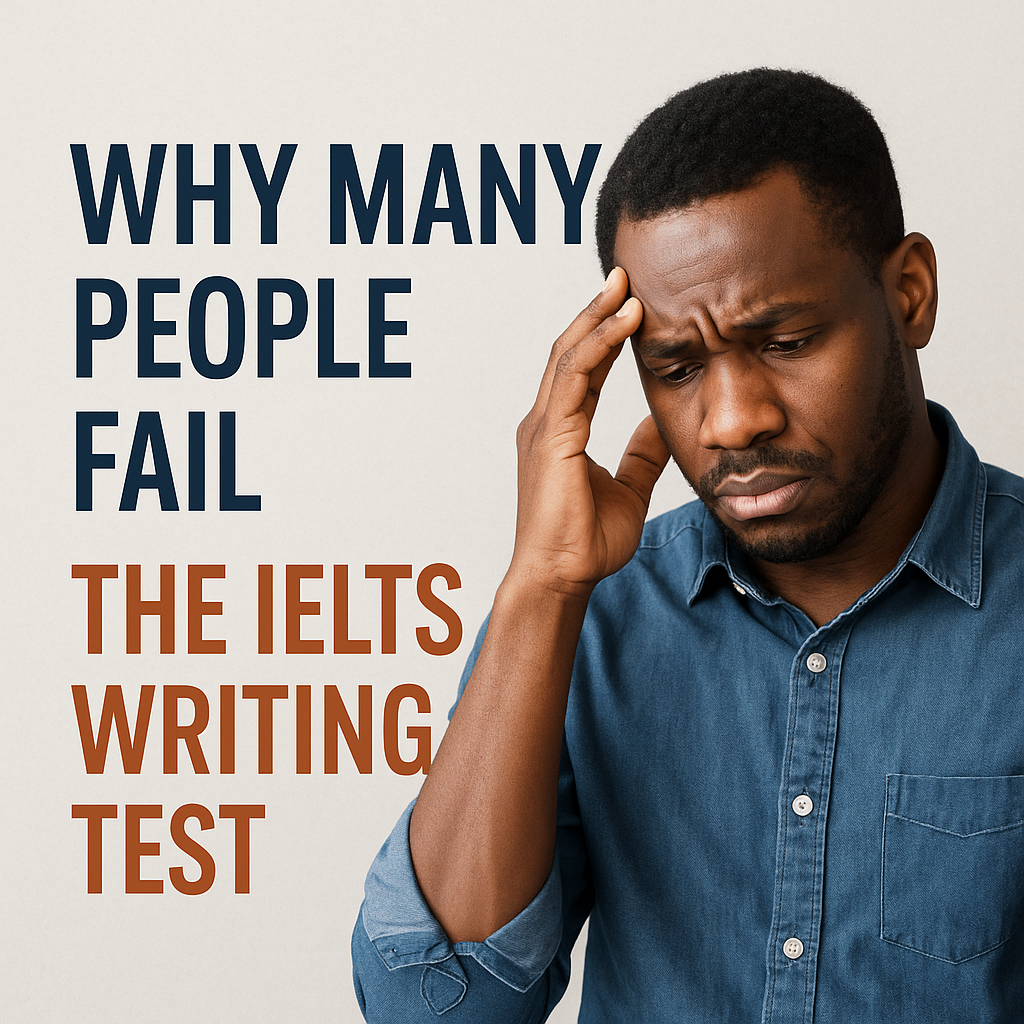1. Misunderstanding the Task
One of the biggest mistakes is not answering the question fully. Some candidates write a beautifully structured essay, but if it drifts away from the topic or misses part of the task, they lose marks. For example, Task 2 may ask for both advantages and disadvantages, but the candidate only writes about one side.
Tip: Always spend the first 3–5 minutes analyzing the question. Underline keywords and identify exactly what the examiner expects.
2. Poor Structure and Coherence
IELTS examiners look for logical flow. If your essay is a random collection of ideas without clear organization, you will score low in Coherence and Cohesion.
Tip: Follow a simple essay structure:
-
Introduction (paraphrase + thesis)
-
Body Paragraph 1 (main idea + explanation + example)
-
Body Paragraph 2 (main idea + explanation + example)
-
Conclusion (summarize + opinion if needed)
3. Weak Vocabulary and Repetition
Using the same words again and again makes writing sound basic. Many candidates overuse words like good, bad, important, problem, solution, which limits their Lexical Resource score.
Tip: Build a bank of synonyms and academic phrases. For example, instead of good, try beneficial, advantageous, favorable.
4. Grammar Mistakes
Frequent grammar errors lower the Grammatical Range and Accuracy score. Common issues include:
-
Subject-verb agreement (people is → people are)
-
Tense consistency (yesterday I go → yesterday I went)
-
Sentence fragments or run-on sentences
Tip: Focus on writing clear, error-free sentences instead of long, complicated ones. Accuracy is more important than complexity.
5. Lack of Academic Tone
Some candidates write too informally, like they are sending a text message or speaking to a friend. Phrases such as “I think this is super cool” are not appropriate for IELTS Writing.
Tip: Maintain a formal, academic tone. For example, say “This approach is highly effective” instead of “This is super cool.”
6. Poor Time Management
Task 2 carries more weight than Task 1, but many candidates spend too much time on Task 1 and then rush through Task 2. Others run out of time and fail to write a conclusion, which hurts their score.
Tip: Manage your 60 minutes wisely:
-
Task 1: 20 minutes
-
Task 2: 40 minutes
7. Not Practicing Under Exam Conditions
Some people only practice casually, writing essays with unlimited time and looking up words in the dictionary. On test day, they panic under time pressure.
Tip: Regularly practice writing essays within 60 minutes, without help. This builds stamina and confidence.
Failing IELTS Writing doesn’t mean you’re bad at English — it often means you didn’t follow the exam’s specific rules. By understanding common pitfalls and practicing strategically, you can dramatically increase your writing score.
Remember: Success in IELTS Writing isn’t about writing like a novelist — it’s about clarity, structure, and accuracy.
EXAMPLE
1.Misunderstanding the Task
Many candidates don’t fully answer the question. For example, if the question asks for both advantages and disadvantages, some only write about one.
Low-band example:
“Technology is important in education. It helps students study.”
(This response is too general and does not discuss both sides of the question.)
High-band example:
“While technology in education provides students with easier access to resources, it may also reduce face-to-face interaction, which is essential for social development.”
(This addresses both advantages and disadvantages as required.)
2. Poor Structure and Coherence
Ideas need to flow logically. Without structure, the essay feels like random sentences.
Low-band example:
“Pollution is bad. People use cars. Factories also. Government should stop it. We can plant trees. It helps.”
High-band example:
“Pollution has become a major concern due to increased vehicle use and industrial activities. Governments should implement stricter environmental regulations, while citizens can contribute by planting more trees to improve air quality.”
(The second version is structured, logical, and easy to follow.)
3. Weak Vocabulary and Repetition
Repeating simple words lowers the score in Lexical Resource.
Low-band example:
“This problem is very big. It is a bad problem for people. Government should stop this bad problem.”
High-band example:
“This issue poses a significant challenge to society. It has serious consequences for citizens’ health, and government intervention is urgently required to mitigate its impact.”
(The second version uses varied and academic vocabulary: significant, consequences, mitigate.)
4. Grammar Mistakes
Frequent grammar errors reduce clarity.
Low-band example:
“Many people is moving to city. It create problem of traffic and pollution.”
High-band example:
“Many people are moving to cities, which creates problems such as traffic congestion and pollution.”
(The corrected version shows subject-verb agreement and proper sentence structure.)
5. Lack of Academic Tone
IELTS Writing requires a formal style.
Low-band example:
“I think it’s super cool that students can use phones in school because it’s fun.”
High-band example:
“Allowing students to use mobile phones in school may enhance learning opportunities, but it also risks increasing distractions during lessons.”
(The second version is formal, balanced, and academic.)
6. Poor Time Management
Some candidates rush through Task 2, which is worth twice as many marks as Task 1. Others don’t write a conclusion, which lowers their score.
Tip: Spend 20 minutes on Task 1 and 40 minutes on Task 2. Always leave 3–5 minutes at the end to check grammar and spelling.
7. Not Practicing Under Exam Conditions
Practicing without timing or relying on a dictionary gives a false sense of readiness. On exam day, many panic when the clock is ticking.
Tip: Practice regularly under strict timing (60 minutes) to build speed and confidence.
Final Thoughts
Failing IELTS Writing usually comes down to exam technique, not English ability alone. By avoiding these mistakes and modeling your writing on high-band examples, you can boost your score.
Remember: the IELTS examiner isn’t looking for fancy poetry — they’re looking for clear, structured, and accurate writing.



